Download me - right click "save target as" | Open Player in New Window
We’ve always found a sort of comfort in confiding in electronic assassins and the silent requiems that are a result of their pursuits, perhaps none more so than our broadcast host this week. The birth of his path dates back to the vibrant cultural paroxysm that was Detroit in the mid to late 80’s which choreographed a timeless blueprint thats true soul is easily recognisable in any performance or release that’s made its way from his world.
Now even though he’s confessed that much of that segment in his life has been pseudo-erased, unintentionally or otherwise, it delivered the infrastructure that supported the exposure for ‘The Autonomous Music Project’, sub explorations with Echospace/CV313 and one of the standout records of 2011 ‘Hash-Bar Loops’ on Soma – that’s all without even grasping the alias’ and back catalogues that encompass various tangents.

We’ll terminate any further projections as it’d only derail the exercise of deploying the decoys that entrench themselves in an ethereal saga. You’re with Rod Modell, aka: Deepchord.
—
Track List:
01. Rod Modell “Pressure Drop” (Unreleased)
02. Gez Varley “Soul Gate” (Force Inc)
03. Ghislain Poirier “Orange Brûle” (12k)
04. Giriu Dvasios “Vesu – Quantic Mix” (Cold Tear Records)
05. Grit “Ride” (mnml ssgs)
06. Glimpse & Alex Jones “True Friends” (Kindisch)
07. Itmar Sagi “Mr Bandi – Original Mix” (Drumcode)
08. Phillipe Cam “Karine” (Kompakt)
09. Merv “Melted Vein” (Dancecop)
10. Pacou “All It Takes” (Cache)
11. Female “Viva” (Downwards)
12. Mike Dehnert “Without” (Fachwerk)
13. Murmur “Mesh” (Meanwhile)
14. Scuba “Aesaunic” (Hotflush Recordings)
15. The Juan MacLean “A Human Disaster – House of House Mix” (DFA)
16. Octal “Heavy Petting” (Thule Musik)
17. Haiko Laux “101/106” (Tresor)
18. Pacou “Minus – MLZ Remix” (cache)
19. Pacou “All It Takes – Huckaby SYNTH Mix” (Cache)
20. Orlando Voorn “Planet Ultra” (Cache)
21. Mark Ernestus “Meets BBC” (Honest Jon’s)
22. GoGooo “Dérive” (mOAR)
—
Kn: Being from Detroit, you wouldn’t of had to look far to find inspiration around you and get caught up in a revolutionary movement developing. How did things play out in those years for yourself and what did you take away from the relationships you forged?
DC: It’s funny… I think I’ve blocked out much of this period. I grew up in Detroit. I went to school there and made friends there. I was at the epicenter of the “techno-revolution” there. I graduated from high-school in 1987, and went into art school after, so I was living in the midst of it all in the late 80’s and early 90’s, and it was influential. However… not much has happened since. It’s sad for me. It seems like many European scenes took over the development of this music, and they have been working it since. Detroit could have been like Berlin. People from Berlin were traveling to Detroit in those years to study the model. They went back with their notes and started vibrant scenes.
Why couldn’t Detroit grow the seed it planted? I think there was too much ego and people trying to run with the ball, and score by themselves and consequently ignoring the rest of the team. I think all the successful techno scenes were developed by teams rather than individuals. If the Detroit techno musicians viewed themselves as part of a team, rather than one guy trying to outdo the other…. we’d have something special today. I really think Mike at Submerge understood this, and tried this, and it looked like it was going to work for a minute, but then it seemed to unfocus.
I learned allot there, and made many friends. Since the 1980’s, Detroit has cleaned up considerably. Lots of face-lifts, and government grants to clean up the urban decay and blight. It looks prettier driving through, but I think it’s more dead than ever. In the midst of “1980’s filthy Detroit”, there was a vibrant art-community drawing from the aesthetic of the city back then. Great things were coming out of there that were fuelled by the gotham-city darkness. Now it’s allot more appealing to national chains and developers, but that inner glow is weaker. I find myself wanting to go there less than ever, and hardly do anymore. Detroit’s soul has been sold. Berlin may be there in 5-7 years too. The club scene there that’s making it so vibrant will be the first thing to go once big-money and developers invest more in the city.
Kn: Like your peers, there would of been one or two defining moments where you felt as though everything clicked and you never looked back. Anything that still stays with you to this day that makes you smile and keeps true to your own perspective on music?
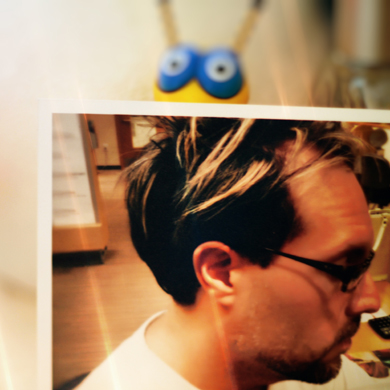
DC: I think that viewing my sound outside of a musical context was profound and liberating. I don’t consider what I do music. Maybe more sound design. I really never wanted to create music. In fact… I always pondered if I was a music hater, or a music lover. Probably a music hater. I view what I do as creating soundscapes for stimulating higher thinking.
20 years ago, I was involved with the Hare Krishna’s. I would chant at the temple everyday. I loved this and looked forward to it. It’s all I wanted to do. I would go into the temple, and start chanting the mantra, and about 10-15 minutes into it, something would snap in my brain. Chanting this loop over and over caused a profound positive change in my head. My system was flooded with endorphins, and I had a euphoric sensation like floating in space.
Later, I moved away from the Krishna’s and wanted to recreate this sensation. I found I could do it by making these loops in my studio. A similar effect was obtained. The looks on peoples faces in a crowded club at 4am is extremely similar to the faces at 4pm in the Krishna temple. The Krishna’s mantra is causing the same psychological effect as a club’s sound system. My job is to make new software to run on the club’s hardware. This is how I view it. I think understanding this loop-aesthetic via my association with the Krishna’s was profound for me. I like repetition. I remember I didn’t listen to anything but “Music For 18 Musicians” by Steve Reich for about a year. Listening to that record intensely for a year was also profound. But interestingly, for inspiration… I look to artists outside of the musical world. I’m more inspired by people like David Lynch and Andy Warhol. Not necessarily by the art they’ve created, but more by their pioneering spirit, and focus.
Kn: You’ve now moved on from Detroit – was the relocation merely a convenience or was it the result of wanting to expand your own aspirations and vista on where you wanted to proceed?
DC: Some people are highly influenced by their surroundings. Others can live anywhere and it has no effect. I’m the type that’s influenced by surroundings, and found Detroit uninspiring. The city felt overwhelmingly dreadful. It was really a downer. I felt like I needed to get out before I was suffocated. It wasn’t out of convenience really. It may actually be more convenient to be there. As time goes on… I actually would like to be more isolated from a metropolis. I think a small community in Estonia sounds good right now. Or Suomenlinna Island near Helsinki. Actually, in recent years, I’ve become fond of Holland. Personally, I find the people there to be most “normal” to me. Their mannerisms and overall way of life seem most similar to mine. I feel less like a tourist there than anywhere else. I actually feel (considerably) more like a tourist when I’m in Detroit. I never felt more like I was home then when in Holland.
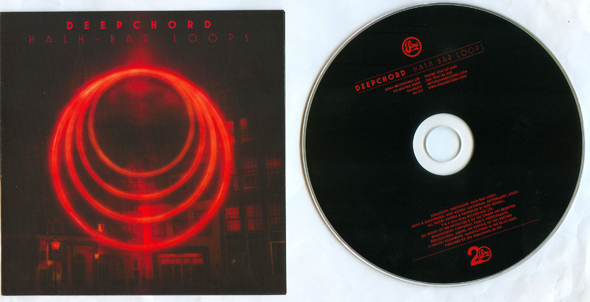
Kn: On the production front, understandably, you have a close affinity with analogue gear. What’s the situation like today if we take a virtual tour of your own studio space, and what gear is still getting a work out and why?
DC: I’m actually breaking away from hardware in favor of a more computer-driven approach. It’s funny… many people make a big deal of the analog gear. The truth of the matter is… I only used hardware because I didn’t have a computer. I got my first computer 4-5 years ago. I was never a computer person. I bought a Prophet 5 in 1989 for $350, and the only reason it was that expensive was because it was mint condition. If it was a little beat up, it would have been $250-$300. That was the going price for a Prophet 5 in the late 80’s. Back then, I bought three TB-303’s for $120. I went into a pawn shop, and they had 3 of them. I asked “how much”, and the guy said “if you take all 3, I’ll do $40 each”. Nobody wanted this stuff back then. Back then an Ensoniq Mirage was $2500 (and there was a waiting list at that price…. when the music store got them in, the whole load was gone same day). Digital was the future. Everyone was dumping Prophet 5’s for DX7’s. So I had a load of this stuff because it was cheap. It only became insanely priced in later years. Then when all the analog gear became expensive… I started stocking up on Linn-Forat 9000’s and SCI Studio 440’s because now, those were cheap.
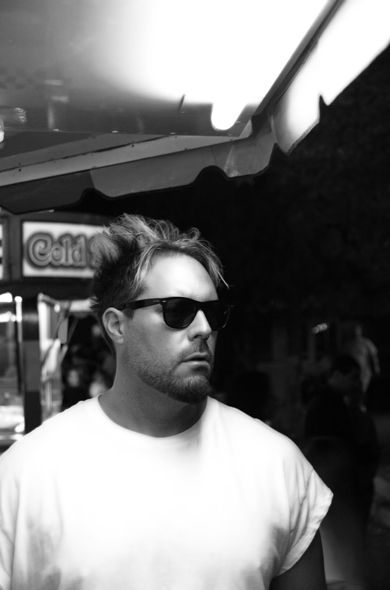
So anyway…. it wasn’t really a conscious decision to use analog gear. It was just because it’s what I had. I think if I had a computer at the time, I would have used that instead. In the late 80’s, if I could have afforded to dump all the analog stuff and buy a Mac + Samplecell cards / Sound Designer II / Turbosynth, I would have, but that cost $5000 at the time. So I stuck with the “junk”… TR808/909, Prophet 5’s, Oberheims etc. In the future, I would like a studio space, that looks like a white cube, with no gear in site. Then I decide to work on music, and take a computer out of a hidden drawer. It’s about Zen.
Honestly, the computer-route IS sonically crappier. It’s true. However…. when you consider all the pluses / minuses of hardware vs. software, the plus list is 2 pages long for software, and one sentence long for hardware (sounds good & fun). That being said… I’ve only used a software synth in one song ever (SYNTH 01 Electromagnetic Dowsing – FM7 test driven by my SND SAM-16 sequencer). But I do plan on more VSTi experiments in the future. But for now, I do like the computer environment for recording, wav editing and FX. I think a computer is the ultimate sampler. I’ve been porting my old Linn 9000, Studio 440, Fairlight IIx, and EIII libraries into the computer over the past few years.
Kn: You’ve undertaken several projects in the past, notably conjuring up various alias’, some of which have now been terminated. What changed on the concept front – allocating the vast sounds of your back catalogue would of meant something to you, a meaning you no longer felt relevant or..?
DC: I guess it’s just different names for different moods / styles. For instance… I did a post-industrial ambient project on Kim Cascone’s Silent label in the mid 90’s. It was processed shortwave radio and MS20 growls. This would never fit on DC. So I guess it was more to delineate between different sounds. I would actually like to revisit some of these side projects. I feel like some of theme weren’t fully realized conceptually, and would like to go back and complete the original vision.
Honestly, right now I’m most into field recordings. It’s almost all I play in my home. I carry a small wav recorder with me everywhere, and record whenever I can. I like playing these all day around the house while doing other things. Like the Tokyo recordings in Liumin and the Amsterdam recordings in Hash Bar Loops. It’s better than photos for recalling a place. But it’s an acquired taste. When I play these recording for friends, they don’t get it. But if you do get it, and can start to enjoy field recordings… you really learn to listen deeply, and this is a skill needed for any musical / sound production. So listening to field recordings can be a great training for all musicians.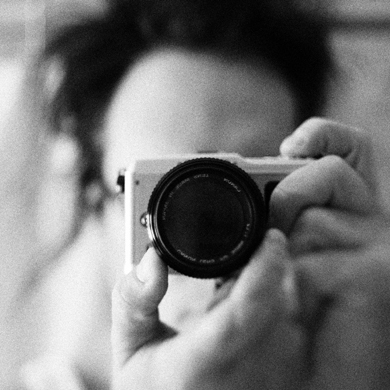
Kn: The question begs – where to from here in the broader scheme of life? If we get the chance to cross paths in some years, which I hope we will, what world do you envisage for yourself?
DC: I would say submerged in the art world more than the music world. I actually always hated being considered a musician. I thought it was way too limited to describe what I do. I like to create conceptual sound worlds. Massive environments. Enveloping audio fields. Without much regard to melody, measure, etc. My audience has been clubs over the years, but honestly… I feel like it belongs more in an art gallery. I love how at Sonar Festival (in Barcelona), how the event takes over local art museums. When I go to Sonar, I never spend any time watching musical acts. I spend all my time absorbing installations in museums.
I think as I get older, I’ll probably become more of a hermit, living in the countryside and working on music, photography and video in equal measure. Maybe Netherlands since it’s the place where I feel the most “in place”. I guess life is an adventure full of possibility. We’ll see how it unfolds. I know, thought, that I’ll always be creating, because to me… it’s the key to self-fulfilment. It’s a purpose for being here. It’s my contribution to society. So I can’t stop, or there would be no reason to go on.
—
Links: Beatport / Booking via Apelago

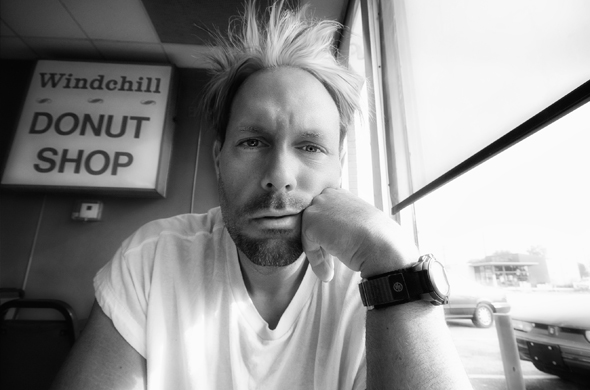
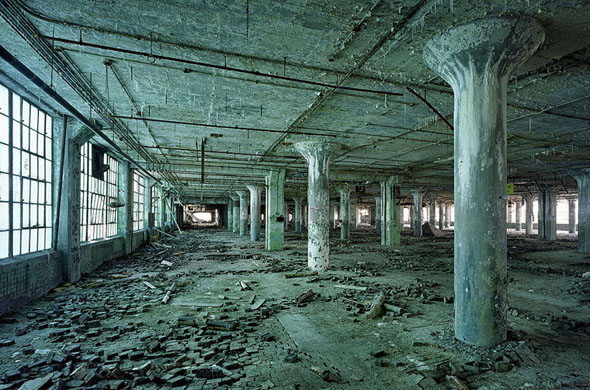
Pingback: Subaudible Experiences » Purpose()
Pingback: Deepchord opens the door on new long player + free track | Kana Broadcasting()
Pingback: Deepchord drops new album ‘Auratones’ on Soma + PREVIEW | Kana Broadcasting()